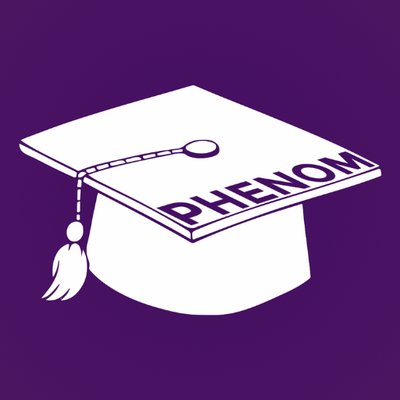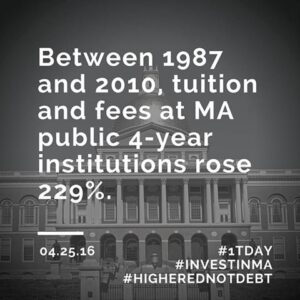Today marks the 4th anniversary of student loan debt crossing the $1 trillion mark
We know the student debt crisis affects nearly 1 million Massachusetts residents, shouldering more than $24 billion of student loan debt. On the fourth anniversary of $1T Day, we have to find a path to high-quality, debt-free public higher education. Massachusetts — we can do better!
Let’s talk about the Commonwealth’s Commitment.
Our students deserve a public higher education system that is well-funded, affordable, accessible, well-staffed, and democratically governed. Last week, the Department of Higher Education announced the Commonwealth Commitment Plan (CCP), aimed at incentivizing community colleges students to enroll full time and successfully transition to a four-year university.
PHENOM is always glad to see officials recognizing the important role community colleges play as a pathway to a four-year degree. More than half of all public higher education students get their start at a community college and they are more likely to be low-income, first-generation, and students of color. Those students have barriers to access that include but often go beyond tuition and fees (which can be covered by federal PELL Grants) and include access to affordable and reliable transportation, childcare, and housing. True affordability requires understanding and helping students overcome these barriers.
The Commonwealth Commitment takes its inspiration from PHENOM’s own proposal, the Finish Line Grants, which would help students to the finish line of graduation by providing one-year completely tuition and fee free attendance at any Massachusetts public college or university for students whose family income is less than the median family income in Massachusetts.
Unfortunately, the Commonwealth Commitment has some deep flaws. It is a program created with no additional funds, which means that the funds will come from other financial aid accounts, or out of the budget used to hire faculty and staff. Furthermore, its various requirements — 3.0 GPA, full-time attendance (eliminating most community college students from consideration), limited majors, and rapid completion (2.5 years for an associates degree, and two more years to a Bachelor’s degree — mean that this will likely reach very few students. At this moment, it is estimated that a grand total of 120 students – out of a total public college and university student body of 260,000 – are currently meeting the requirements and following the pathway laid out by the program.
While PHENOM applauds the goal of helping students afford to complete their college education, we fear this is more messaging ploy than true affordability program. Given that other cities and states have implemented various forms of free public higher education — Tennessee, Georgia, Chicago, Philadelphia — this proposal is disappointingly limited. Massachusetts should be pushing the outer limits of progressive educational policy. Instead, we are dressing up weak proposals as revolutionary change.
The starting point is for the Governor and the Legislature to step up and make sure public higher education is adequately funded. Governor Baker’s budget, as well as the the House FY17 budget, includes nothing to pay agreed-upon contracts with faculty and staff, thereby effectively cutting campus budgets and forcing tuition and fee hikes — rendering the “commitment” empty. State funding for public higher education remains 20% below FY01 levels. While the Legislature made progress to restore that funding over the last three years, the Governor’s and the House FY17 budget suggests public higher education is no longer a priority.


